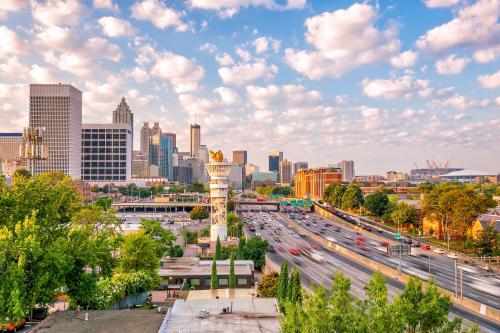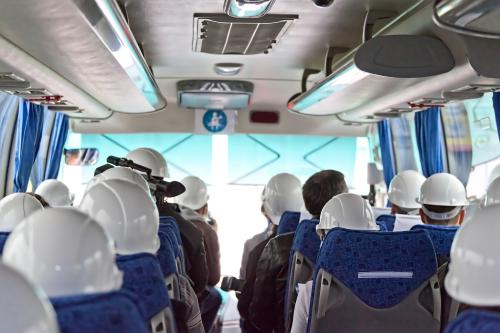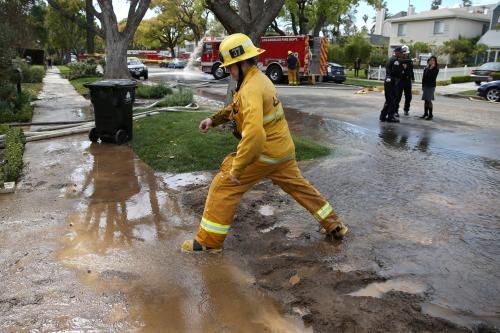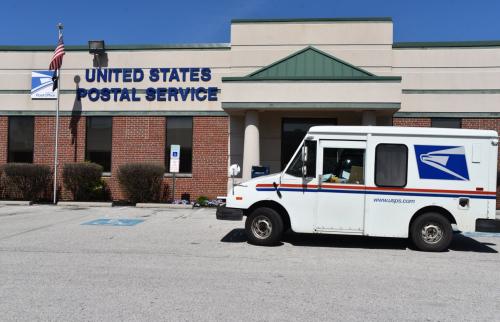This article was originally published in The Hill.
Infrastructure talks are heating up again. In just the last week, 2020 presidential candidate Amy Klobuchar pitched a trillion-dollar infrastructure proposal while the Trump administration and Congress continue to flirt with major infrastructure packages. This kind of thinking reflects clear public support for greater investment.
While these concepts and conversations suggest bipartisanship could deliver infrastructure reform, the current state of national politics delivers anything but an infrastructure boost. Put bluntly, when political discord leads to infrastructure failure, it doesn’t just deepen our distrust of government—it also takes our economy down with it.
After all, it was only months ago when fights between House Democrats and the Republican White House spilled over into our airports. With public employees and contractors forced to work without pay during the budget shutdown, it was little surprise that TSA security officers and air traffic controllers started calling in sick. Then, 35 days after the shutdown began, LaGuardia Airport closed due to staffing shortages. The budget fight ended just hours later.
While the budget fight may be over (for now), our political system is regularly causing less perceptible but more sustained disruptions to our road, water, and other physical networks. We can no longer afford this kind of unnecessary economic harm due to short-sighted politics.
This administration’s trade and tariff policies serve as a potent example of self-inflicted economic harm. Since the Trump administration applied tariffs on imported steel and aluminum, the cost index for steel mill products alone rose by almost 14 percent from March 2018 to January 2019. This directly impacts our state departments of transportation, their local peers, and water authorities who all rely on steel and aluminum to construct major capital projects. As Mark Niquette at Bloomberg reported, states from California to Michigan to Virginia have already seen certain project costs jump by millions of dollars. Meanwhile, steel and aluminum manufacturers in the U.S. have been hit hard by the costs, needing to lay off workers to close budget gaps.

Price increases can act as a fiscal virus, infecting an agency’s entire project pipeline. Since infrastructure agencies work on tight budgets and are naturally capital-constrained, there’s only so much construction to go around. So, when current projects start costing significantly more, agencies have no choice but to delay other projects. If the tariffs remain in future years—and the politically-motivated rhetoric suggests the president will keep them—the effects will only compound as more projects are either delayed or outright scrapped.
The net result: lower quality infrastructure than if the country never instituted the new tariffs. Oddly enough, while the president pushes a trade war to boost global competitiveness, our domestic infrastructure will be less prepared to power our economy once the war is over.
Politics disrupting our infrastructure stretches far beyond tariff fights. For example, the U.S. Department of Transportation has now twice delayed promised capital grants to local transit agencies. Similarly, Congress and the Federal Aviation Administration cannot agree on how to manage and comprehensively fund a new satellite-based air traffic control system. They’re all guaranteed ways to raise infrastructure costs in the long-term and reduce public trust today.
That’s why these next two- and four-year periods are so important at the federal level.
For the nearly two years remaining on President’s Trump term, there is a major negotiation coming with congressional Democrats around our next surface transportation bill, if not a larger infrastructure package. If the two parties can craft a bill that boosts investment around long-run needs—from resilience to electrification to digitalization—and reduce tariff impacts in the process, we’ll all be in a better place. Washington has the chance to give long-run certainty to our state and local partners, who build all the projects and pay the majority of costs, anyway.
But if political compromise doesn’t happen—and we have our doubts—the pressure will only be higher on the next Congress and president to deliver a more collaborative, bipartisan vision for the country’s future. It’s why we’re not just watching what happens on the Hill these next couple years, but why we all should carefully watch the infrastructure and trade platforms put together by the Democratic candidates for president.
Of course, everyday Americans use infrastructure systems that remind us what political compromise can deliver. The national highway network is still one of the world’s great capital projects. The commercial air network is the busiest and safest in the world. We’ve grown accustomed to clean water access and are shocked when it fails.
But we have to remember how easily our politics can upend high-functioning infrastructure. As the budget fight grounded planes at one of the busiest airports in our nation’s biggest city, stacking up on the runway, the image said it all. Unnecessary gridlock eventually drags us all down.
The Brookings Institution is committed to quality, independence, and impact.
We are supported by a diverse array of funders. In line with our values and policies, each Brookings publication represents the sole views of its author(s).







Commentary
Political gridlock blocks infrastructure progress and costs our economy
April 25, 2019